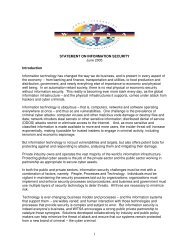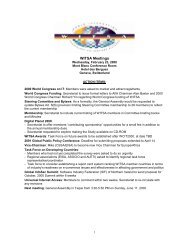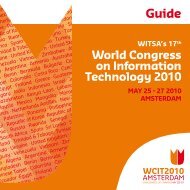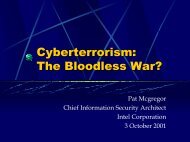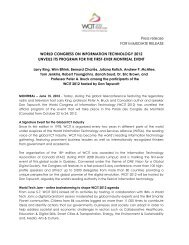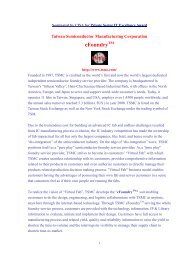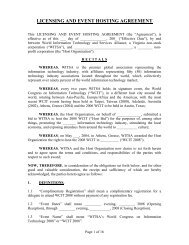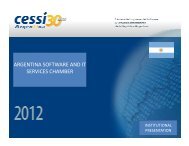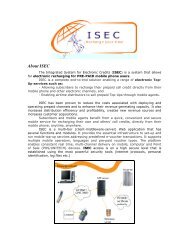Digital Planet - Executive Summary v1 - WITSA
Digital Planet - Executive Summary v1 - WITSA
Digital Planet - Executive Summary v1 - WITSA
- No tags were found...
You also want an ePaper? Increase the reach of your titles
YUMPU automatically turns print PDFs into web optimized ePapers that Google loves.
<strong>Digital</strong> <strong>Planet</strong>The Global Information Economy<strong>Executive</strong> <strong>Summary</strong>A Study Presented by the World Information Technology and Services Alliance (<strong>WITSA</strong>)How big is the worldwide Information and CommunicationsTechnology (ICT) market, and how fast is it growing?Which country markets and which specifictechnology segments show the largest net increase in ICTspending and usage? How does spending on ICT affectcompanies, individuals — and beyond that — economies,employment, creation of wealth, and knowledge?Economists, ICT vendors, and policy makers have beentrying to answer these and related questions for years. Thisstudy represents the first truly global analysis of these complexissues. The World Information Technology and ServicesAlliance (<strong>WITSA</strong>) commissioned International DataCorporation (IDC) to compile and analyze statistics thatput the single, most significant technology-based socialtransformation of the late 20th century — the emergenceof the information society — into perspective.To obtain the broadest, most comprehensive view of themarket, IDC studied the ICT industries in each of the 50largest country markets around the globe (as well as four“rest of world” regions), representing 98% of the world’sspending on ICT and 97% of the world’s aggregate GrossDomestic Product (GDP). The study also evaluated severalsocial variables to measure the impact of ICT beyond businessand into schools, homes, and everyday lives. The datawere gathered and evaluated using consistent methodologiesand definitions.The answers are clear. Spending on information and communicationstechnology is a critically important element ofthe worldwide economy. The ICT industry is among themost significant contributors to the overall economichealth of the global economy. The sheer bulk of its contributionis enormous (see Figure 1).• ICT is responsible for $1.8 trillion in spending in1997, approximately 6% of aggregate global GDP.This is greater than the GDP of France and almosttwice the size of the GDP of the state of California.• In 1997, ICT spending was nearly 40% larger than in1992. It is growing 27% faster than the overall worldwideGDP, which has grown by an average of 5.5%annually for the past five years.• The explosion in worldwide ICT cuts across traditionalbarriers — ICT spending has grown in everyeconomy worldwide over the past five years, regardlessof GDP or population growth rates.• During 1992–1997, Asia/Pacific, Latin America, andEastern Europe demonstrated the fastest growing ICTspending markets with 5-year average annual growthrates of 14.5%, 13.6%, and 9.5% respectively.The fact that Microsoft has recently replaced General Electricat the very top of the market capitalization tables (TheWall Street Journal, September 15, 1998) is further proof ofthe prominence of the ICT sector in the global economy.As enormous as these contributions to worldwide economicgrowth and development may seem, the downstreameffects on wealth-building are actually the industry’sgreatest contribution. The simple description of raw size orbarely-bridled growth does not begin to measure the farreachingeffect of ICT throughout society. And it does notaddress a host of far more interesting questions that cut tothe heart of issues important to technologists, managers,sociologists, legislators, and others, including:INTERNATIONAL DATA CORPORATION 1998 Page 1


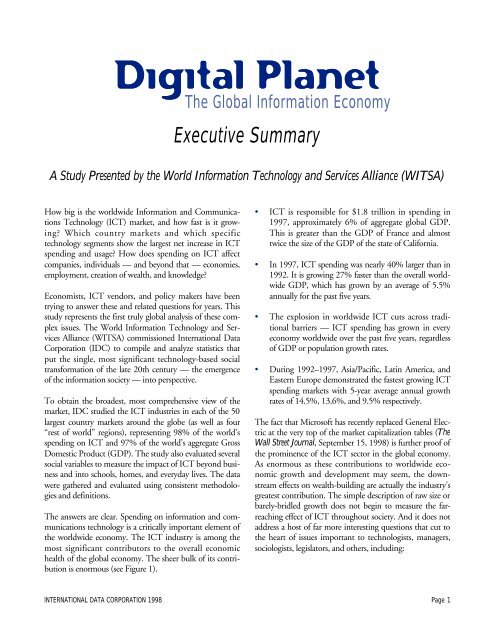
![witsa-[association member] ict excellence awards program](https://img.yumpu.com/51340170/1/190x245/witsa-association-member-ict-excellence-awards-program.jpg?quality=85)
